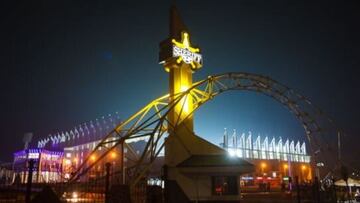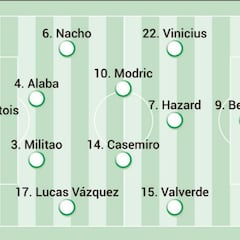Where is Sheriff Tiraspol from? What's Transnistria?
Real Madrid welcome the club to the Santiago Bernabéu on Tuesday evening in the Champions League group stage, but what do you know about their opponents?


Real Madrid's opponents on Tuesday are a small club in sporting terms, relatively unknown around the globe. But Sheriff Tiraspol have a unique history, effectively being the ‘national team’ of Transnistria, and there is a lot more to their current domestic dominance, as well as their foray into an elite football competition, to know.
You may also enjoy:
- Real Madrid dream realised for Sheriff captain Castañeda
- Real Madrid team news, possible starting XI against Sheriff
- Mbappé not Messi is the PSG number one, claims Anelka
- Ancelotti on Sheriff, Modric, Kroos, Zidane, Mendy
- Kroos back in for Real Madrid
- How to watch the Champions League in the USA: TV, online
Sheriff Tiraspol: how they arrived at the Santiago Bernabéu
The capital city of Transnistria is Tiraspol. The breakaway state of Transnistria sits on the border or Moldova and the Ukraine and it means that there is a majority of its people from Russia, not Moldovia, with Vladimir Putin’s regime having a notable presence in the region, including their flag holding on to the hammer and sickle logo from the old Soviet flag. It may come as no surprise to those a little more familiar with the geopolitics in the area that Transnistria has not been recognised by any member of the United Nations.
Sheriff reached the Champions League as the winner of the Moldovan League - winning 19 since 2001, including the last six in a row - ironically the country from which Transnistria declares itself independent. This is not the only oddity, however, of a very rich team in one of the poorest areas of Europe.
Founded in 1997 by oligarch Viktor Gushan, FC Sheriff owes its first appearance in the Champions League group stage to the vast sums of money from the all-powerful conglomerate run by this former policeman and alleged agent of the defunct KGB.
If it is normal for states to have public companies, in this case a private company, Sheriff, is the one that seems to have an 'unrecognised' state backer.
Sheriff, Sheriff, Sheriff - supermarkets, gas stations, restaurants
"The Sheriff brand and crest are present everywhere," Spanish coach of Indian FC Goa, Juan Ferrando, who coached the team in Tiraspol in 2013, told EFE.
"Wherever you go: to the restaurant, the supermarket, the gas station...", continues the Catalan, who has excellent memories of his time in charge of The Wasps, as the team is known due to the yellow and black colours that identify them.
"It can seem as if you live inside the club,” recalls Ferrando about the omnipresence of the team and company symbols in the public life of Transnistria, where Sheriff firms have a monopoly in key sectors and control, according to experts, 60% of the economy.
From USSR to Transnistria
The origins of the Sheriff group can be traced back to the 1990s, when Gushan saw his riches grow from the most lucrative privatisation in the newly created separatist "republic" of Transnistria. This tiny territory bordering the Ukraine, unilaterally declared its independence from Moldova, which emerged as a sovereign state during the process that led to the dissolution of the Soviet Union in 1991.
Moscow's support, and the presence of a strong contingent of Russian soldiers in the region, have allowed Transnistria to remain a de facto independent state ever since, although on paper it remains part of Moldova and is not formally recognised by any other country in the world. This legal limbo has lasted for more than three decades and has condemned the separatist region, whose urban landscape is still dominated by Soviet-era symbols such as battle tanks displayed as monuments or statues of Lenin, to isolation.
European smuggling
Transnistria's semi-clandestine status has also made it a particularly fertile ground for illicit activities such as human trafficking and smuggling. Cigarettes, petroleum and, at one time, Soviet weaponry and ammunition from USSR depots in the area were all moved around.
According to academic and journalistic research, the Sheriff group uses its hegemony in the legal economy to control much of this lucrative illegal business as well. What a picture we’re painting for those new to the situation.
Sheriff politicking
The Sheriff group's position of strength also extends to the political sphere. Just as it created a football team in 1997, the Sheriff group also founded its own political party in 2000, Obnovlenie, which translates from Russian as ‘Renewal’.
Obnovlenie won its first elections in 2005, and gained 29 out of 33 deputies in the elections to the Supreme Soviet - as the Transnistrian parliament is still called - in November last year.
#Russia again conducted its #DumaElections in #Moldova's Transnistria region, which violates international law. 27 polling stations (PS) were opened in this region, which is the highest number of PS opened in this region by Russia so far, reports @promolex https://t.co/X0bkh3Myh7 pic.twitter.com/QO7rLklHYp
— EPDE (@EPDE_org) September 20, 2021
A great diplomatic victory
The fruitful symbiosis between Gushan's group and Transnistria's political class has reaped one of its most spectacular results with Sheriff's qualification into the group stage of the Champions League.
"Sport is also a form of soft power,” Moldova-based investigative journalist Madalin Necsutu remarked. “In this case it will help aid the separatist region of Transnistria to gain international visibility," he continued.
Related stories

Real Madrid dream realised for Sheriff captain Castañeda
"What the separatist regime has not achieved even at the regional level through traditional diplomacy, it is now achieving at the global level through football with the image of Sheriff playing against teams like Real Madrid.”
How they get on at the home of the most successful club in Europe's top competition is yet to be seen, but their captain is feeling positive about what they can bring. You can follow all the action live with our inimitable coverage.
